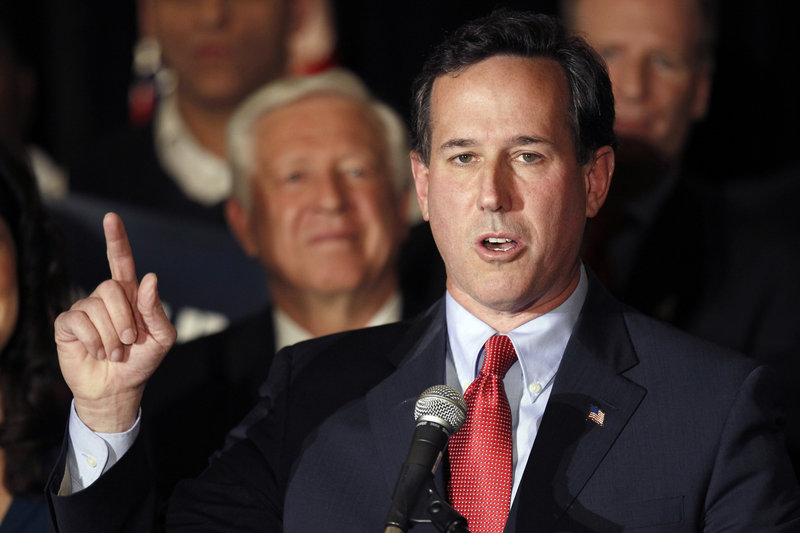Mitt Romney’s carefully plotted path to the Republican presidential nomination is now a long, unpredictable journey that could last months.
The next major tests are primaries in Arizona and Michigan on Feb. 28, where Romney has been heavily favored. A week later, 10 states vote on March 6, Super Tuesday, when the former Massachusetts governor was hoping to all but clinch the nomination.
Not anymore.
With victories Tuesday in Colorado, Minnesota and Missouri, Rick Santorum became a threat. The sweep by the former U.S. senator from Pennsylvania exposed long-held voter qualms about Romney, and conservatives are likely to take a fresh look at Santorum.
“I don’t think this changes the title of front-runner (for Romney), but it underscores the fundamental problem he has with the party base,” said Larry Sabato, the director of the University of Virginia Center for Politics. “They just don’t trust him, and they don’t connect to him personally. He has serious, serious problems.”
Arizona and Michigan have strong conservative bases. Santorum’s faith-and-family message could appeal to them.
“After yesterday, I think everything’s in play,” said Jim Haynes, president of the Phoenix-based Behavior Research Center, a nonpartisan market research and polling firm.
Even in Michigan, where Romney’s father was governor in the 1960s, the race could tighten. “There’s an opportunity for Santorum to give Romney a black eye,” said Douglas Koopman, a professor of government at Calvin College in Grand Rapids, Mich.
Super Tuesday’s most closely watched race is likely to be Ohio, the kind of diverse swing state that a general-election candidate historically has to win. Romney faces the same conservative suspicion there that he does elsewhere.
As a result, “It’s a volatile state,” said Paul Beck, a professor of political science at Ohio State University.
Super Tuesday also will provide opportunities for Santorum, Texas U.S. Rep. Ron Paul and Newt Gingrich, a former speaker of the House of Representatives. Paul is pushing hard in caucuses, while Gingrich is eyeing Oklahoma, Tennessee and Georgia.
Gingrich has Southern roots, having represented an Atlanta-area district for 20 years. His only victory so far came last month in neighboring South Carolina, where his angry-man, populist appeal propelled him to a big win.
But Gingrich is no Southern shoo-in, said Merle Black, a professor of politics and government at Emory University in Atlanta. Santorum has strong appeal to conservative Christians, who are influential in the Southern GOP.
“There are a lot of issues where Santorum would be seen as more consistent than Gingrich or Romney,” Black said. “And with Gingrich, you always have questions of judgment.”
A bigger question in the states ahead involves Romney’s political judgment, or, as Sabato put it, “his arrogance.”
Early Tuesday, Romney’s political director, Rich Beeson, sent a memo to the news media, trying to downplay the day’s importance.
It was classic Romney, full of facts and well-reasoned arguments. No delegates were being selected Tuesday, Beeson argued, and besides, “there is no way for any nominee to win first place in every single contest.”
All true, and it’s also worth noting that the Colorado and Minnesota caucuses attracted about 65,000 and 50,000 voters, respectively, in states where general-election turnout reaches millions. In short, not many people voted Tuesday, and no convention delegates were chosen.
But Romney’s carefully calibrated logic ignored a maxim of modern political life: Psychology matters, and the media and the political world saw Tuesday as a big deal. Santorum’s sweep changed the conversation completely. Romney’s wins last week in Florida and Nevada are no longer Topic A.
Santorum also got help from two other developments that converged this week.
The Obama administration said it would require religious institutions to include coverage for contraception in their health insurance plans, outraging many Roman Catholics. And Tuesday, a federal appeals court overturned a California ban on gay marriage.
“It was the perfect confluence of events for Santorum,” said Koopman. “Social issues were again at the top of the agenda.”
Still, Romney retains important advantages: 1,144 delegates are needed to nominate, and his deep pockets and extensive organization are unmatched. He also has shown strong support among voters who are looking for the candidate who is most likely to beat President Obama in November. If he fails to move voters passionately, he succeeds in moving many to make calculated decisions in his favor.
But what he has indisputably lost is the opportunity to begin running now against Obama as the statesmanlike consensus GOP candidate.
Instead, he’s likely to savage Santorum, just as he tore Gingrich apart in Florida with a barrage of negative attacks – even though polls there showed that alienated the centrist independents he’ll need in November.
If Romney is to win the nomination, he’ll do it by “winning ugly,” as Black put it, possibly alienating many voters and raising questions about his strength come fall.
He probably has no choice. As Sabato put it, “He’s going to have to keep his foot on the gas pedal.”
Send questions/comments to the editors.



Success. Please wait for the page to reload. If the page does not reload within 5 seconds, please refresh the page.
Enter your email and password to access comments.
Hi, to comment on stories you must . This profile is in addition to your subscription and website login.
Already have a commenting profile? .
Invalid username/password.
Please check your email to confirm and complete your registration.
Only subscribers are eligible to post comments. Please subscribe or login first for digital access. Here’s why.
Use the form below to reset your password. When you've submitted your account email, we will send an email with a reset code.